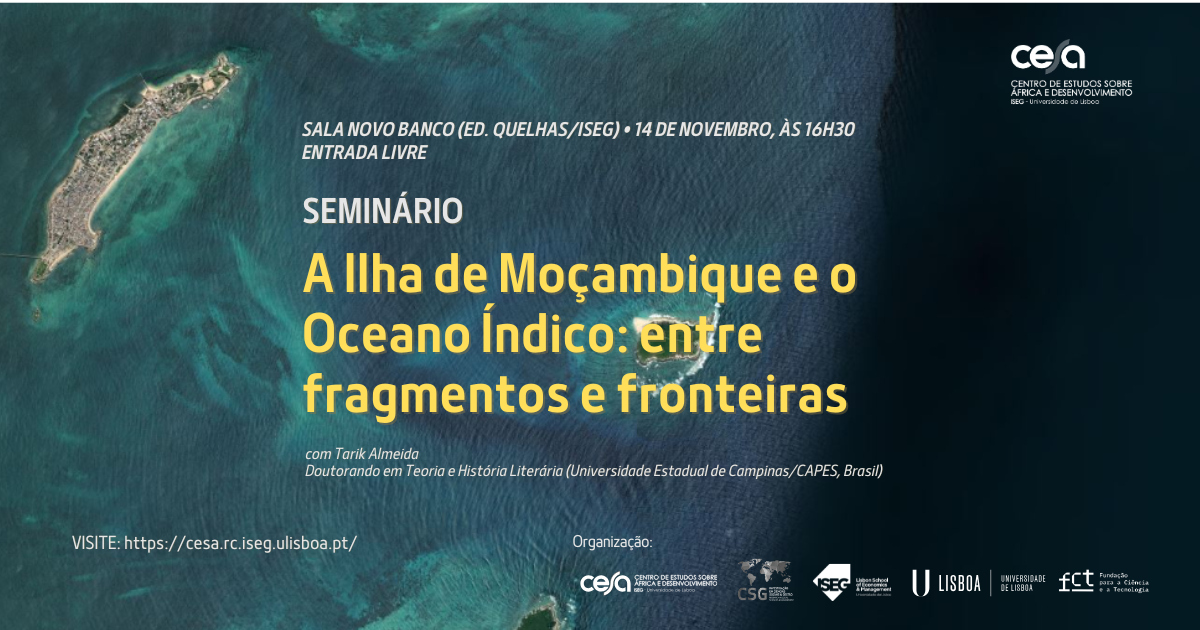Seminar ‘The Island of Mozambique and the Indian Ocean: between fragments and borders’ on November 14, 4:30 p.m., at ISEG
CEsA – Centre for African and Development Studies invites you to the Seminar The Island of Mozambique and the Indian Ocean: Between fragments and borders, which will take place on November 14 at 4:30 p.m. in the Novo Banco Room – ISEG (Rua do Quelhas 6, Quelhas Building, 4th Floor), with free admission.
The seminar will be presented by Tarik Almeida, a PhD candidate in Literary Theory and History at the Institute of Language Studies at the University of Campinas (IEL/Unicamp – CAPES/Brazil). Since September, the researcher has been undertaking an internship hosted by CEsA, under the supervision of researcher Jessica Falconi.

About ‘The Island of Mozambique and the Indian Ocean: Between fragments and borders’
- In what ways can Mozambique Island and the Indian Ocean be studied as “aesthetic and conceptual” frameworks for African Literatures?
- How might the genealogical position of Mozambique Island and the Indian Ocean influence the construction of poetic and cultural identities in Mozambique and, more broadly, in African literature?
- What challenges and opportunities arise in contemporary literary criticism of African Literatures with the incorporation of ecocritical perspectives?
This seminar aims to interrogate or revisit two key frameworks for a systematic study of Mozambican poetry, particularly its Indian Ocean influence: the Island of Mozambique and the Indian Ocean itself. To this end, we seek to reflect on the relationship between fragment(s) and border(s) to explore: 1) certain historical and historiographic issues related to the Island of Mozambique and the Indian Ocean; 2) the potential genealogical position of the Island and the Indian Ocean as “aesthetic and conceptual” (Brugioni, 2021) frameworks for the study of African Literatures; 3) the role of literary criticism of African Literatures in the Contemporary era, particularly within the scope of ecocriticism. In this way, the relationship between border and fragment acquires a methodological and conceptual view and will be approached as units of analysis for (re)considering the Island of Mozambique and the Indian Ocean, and their ecological, historical, and cultural borders. The corpus selected for this seminar is primarily Mozambican poetry, with a focus on the poetic works of authors such as Luís Carlos Patraquim, Ana Mafalda Leite, and Sangare Okapi, seeking at the same time to situate them within Mozambican frames of correspondence, in their networks of intertext.
About Tarik Almeida
 Researcher in the field of Literary Theory and Comparative Literature. Almeida holds a degree in Portuguese Language and Corresponding Literatures and a master’s degree in Literary Studies from the State University of Maringá (Brazil). He is currently a PhD candidate in Literary Theory and History at the Institute of Language Studies of the State University of Campinas (Brazil). Since September, he has been undertaking an internship hosted by CEsA, under the supervision of researcher Jessica Falconi and within the framework of the Doctoral Sandwich Program Abroad (PDSE/CAPES).
Researcher in the field of Literary Theory and Comparative Literature. Almeida holds a degree in Portuguese Language and Corresponding Literatures and a master’s degree in Literary Studies from the State University of Maringá (Brazil). He is currently a PhD candidate in Literary Theory and History at the Institute of Language Studies of the State University of Campinas (Brazil). Since September, he has been undertaking an internship hosted by CEsA, under the supervision of researcher Jessica Falconi and within the framework of the Doctoral Sandwich Program Abroad (PDSE/CAPES).
Read more:
Author: CEsA Communication (comunicacao@cesa.iseg.ulisboa.pt)
Image: CEsA/Reproduction





